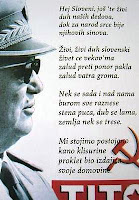The National Anthem of Uruguay
 Adopted in 1845, "Orientales, la Patria o la tumba!" is a typical example of a Latin American epic anthem. The original poem had eleven verses. These type of anthems are very operatic in nature, not only does the opening of this anthem resemble Verdi's style, the chorus and the solo part resembles a Donizetti or Bellini opera.
Adopted in 1845, "Orientales, la Patria o la tumba!" is a typical example of a Latin American epic anthem. The original poem had eleven verses. These type of anthems are very operatic in nature, not only does the opening of this anthem resemble Verdi's style, the chorus and the solo part resembles a Donizetti or Bellini opera.  The version of the anthem usually performed starts with the chorus, then the first verse, then the chorus again, however, most lines are repeated several times within the song, making the song quite long (another feature of "Latin American epic anthems"), Uruguay's anthem is often performed at well over 3 minutes, four or five minute performances of the commonly sung version are not uncommon.
The version of the anthem usually performed starts with the chorus, then the first verse, then the chorus again, however, most lines are repeated several times within the song, making the song quite long (another feature of "Latin American epic anthems"), Uruguay's anthem is often performed at well over 3 minutes, four or five minute performances of the commonly sung version are not uncommon.Both the lyricist (Francisco Esteban de Figueroa) and composer (Jose Debali), who composed the music several decades after the words were composed, also wrote the anthem for Paraguay. "Orientales", mentioned in the lyrics and the title, is a common name for Uruguayans, and it can be literally translated as "people of the East"
Francisco José Debali (July 26, 1791 – January 13, 1859) was a Hungarian-born composer who emigrated to Uruguay in 1838. He authored the national anthem of Uruguay and, possibly, the tune to Paraguayos, República o Muerte, which became the Paraguayan anthem.
As ethnic Hungarian, his original Eastern order name was Debály Ferenc József. His Christian names were later in Uruguay translated into the Spanish version, but his surname is known to be spelled as Debali, de Bali, Debáli, Debály and Debally.
He played the oboe. In 1820, he went abroad to pursue his musical career in the Kingdom of Sardinia. There, in Alessandria, he married Magdalena Bagnasco, from Genoa. They had several children, some of which were born in Uruguay. After a short stay at São Paulo, Brazil, which he fled because of a yellow fever epidemic, Debali arrived in Uruguay in 1838. Here he was the director of the orchestra at the Sala de Comedias in Montevideo from 1841 to 1848.
In 1845 he composed what would be adopted three years later as the Uruguayan national anthem, to a text by Francisco Acuña de Figueroa. It was played for the first time in public on July 19, 1845.
As ethnic Hungarian, his original Eastern order name was Debály Ferenc József. His Christian names were later in Uruguay translated into the Spanish version, but his surname is known to be spelled as Debali, de Bali, Debáli, Debály and Debally.
He played the oboe. In 1820, he went abroad to pursue his musical career in the Kingdom of Sardinia. There, in Alessandria, he married Magdalena Bagnasco, from Genoa. They had several children, some of which were born in Uruguay. After a short stay at São Paulo, Brazil, which he fled because of a yellow fever epidemic, Debali arrived in Uruguay in 1838. Here he was the director of the orchestra at the Sala de Comedias in Montevideo from 1841 to 1848.
In 1845 he composed what would be adopted three years later as the Uruguayan national anthem, to a text by Francisco Acuña de Figueroa. It was played for the first time in public on July 19, 1845.






